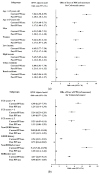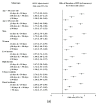Proton Pump Inhibitors and Likelihood of Colorectal Cancer in the Korean Population: Insights from a Nested Case-Control Study Using National Health Insurance Data
- PMID: 38067310
- PMCID: PMC10705191
- DOI: 10.3390/cancers15235606
Proton Pump Inhibitors and Likelihood of Colorectal Cancer in the Korean Population: Insights from a Nested Case-Control Study Using National Health Insurance Data
Abstract
The potential connection between proton pump inhibitors (PPIs) and colorectal cancer (CRC) risk remains unclear, with specific ethnic genetic backgrounds playing a role in PPI-induced adverse effects. In this nested case-control study, we investigated the risk of CRC in relation to preceding PPI use and the duration of use using data from the Korean National Health Insurance Service-National Sample Cohort database, including 9374 incident CRC patients and 37,496 controls. To assess the impact of preceding PPI exposure (past vs. current) and use duration (days: <30, 30-90, and ≥90) on incident CRC, we conducted propensity score overlap-weighted multivariate logistic regression analyses, adjusted for confounding factors. Our findings revealed that past and current PPI users had an increased likelihood of developing CRC. Regardless of duration, individuals who used PPIs also had higher odds of developing CRC. Subgroup analyses revealed that CRC occurrence increased independent of history or duration of prior PPI use, consistent across various factors such as age, sex, income level, and residential area. These findings suggest that PPI use, regardless of past or present use and duration of use, may be related to an increased risk of developing CRC in the Korean population.
Keywords: colorectal cancer; national healthcare data; nested case–control study; proton pump inhibitor.
Conflict of interest statement
The authors declare no conflict of interest.
Figures




Similar articles
-
Association between Migraines and Prior Proton Pump Inhibitor Use: A Nested Case-Control Study Using a National Health Screening Cohort.Pharmaceuticals (Basel). 2022 Nov 10;15(11):1385. doi: 10.3390/ph15111385. Pharmaceuticals (Basel). 2022. PMID: 36355557 Free PMC article.
-
Possible Association between the Use of Proton Pump Inhibitors and H2 Receptor Antagonists, and Esophageal Cancer: A Nested Case-Control Study Using a Korean National Health Screening Cohort.Pharmaceuticals (Basel). 2022 Apr 22;15(5):517. doi: 10.3390/ph15050517. Pharmaceuticals (Basel). 2022. PMID: 35631344 Free PMC article.
-
Gout and Colorectal Cancer Likelihood: Insights from a Nested Case-Control Study of the Korean Population Utilizing the Korean National Health Insurance Service-National Sample Cohort.Cancers (Basel). 2023 Nov 27;15(23):5602. doi: 10.3390/cancers15235602. Cancers (Basel). 2023. PMID: 38067309 Free PMC article.
-
Proton pump inhibitors and the risk of colorectal cancer: a systematic review and meta-analysis of observational studies.Int J Colorectal Dis. 2020 Dec;35(12):2157-2169. doi: 10.1007/s00384-020-03717-5. Epub 2020 Aug 18. Int J Colorectal Dis. 2020. PMID: 32808072
-
Proton pump inhibitors and colorectal cancer: A systematic review.World J Gastroenterol. 2021 Nov 28;27(44):7716-7733. doi: 10.3748/wjg.v27.i44.7716. World J Gastroenterol. 2021. PMID: 34908809 Free PMC article.
Cited by
-
Proton Pump Inhibitors and Oral-Gut Microbiota: From Mechanism to Clinical Significance.Biomedicines. 2024 Oct 7;12(10):2271. doi: 10.3390/biomedicines12102271. Biomedicines. 2024. PMID: 39457584 Free PMC article. Review.
-
Proton Pump Inhibitor Use and Its Association with Lung Cancer Likelihood and Mortality: A Nationwide Nested Case-Control Study in Korea.Cancers (Basel). 2025 Mar 4;17(5):877. doi: 10.3390/cancers17050877. Cancers (Basel). 2025. PMID: 40075724 Free PMC article.
References
Grants and funding
LinkOut - more resources
Full Text Sources
Miscellaneous

